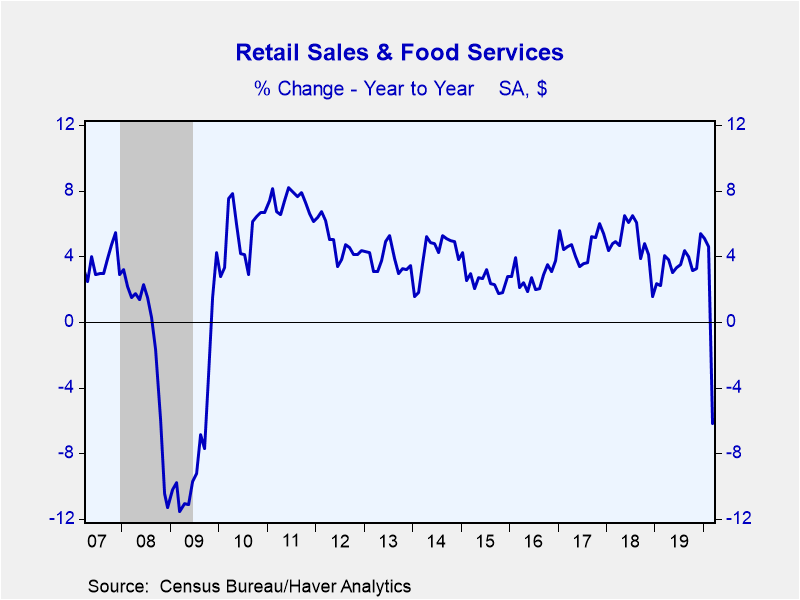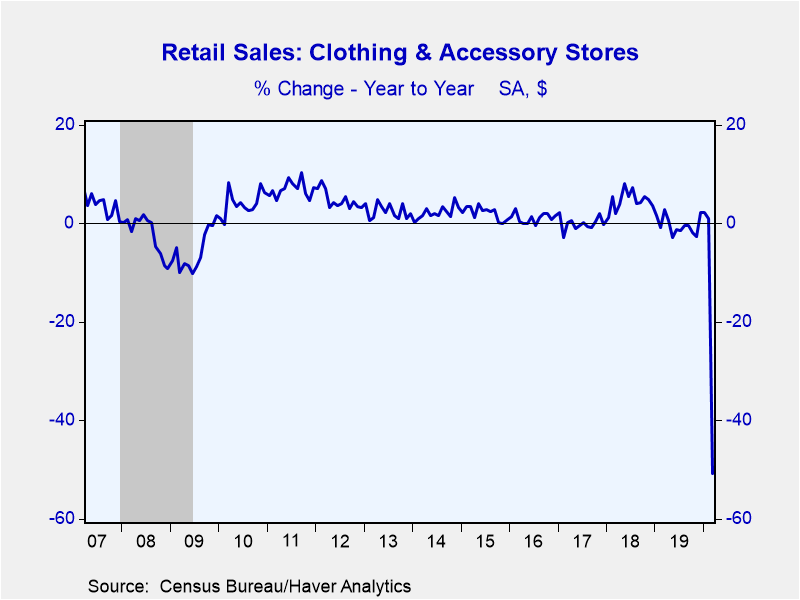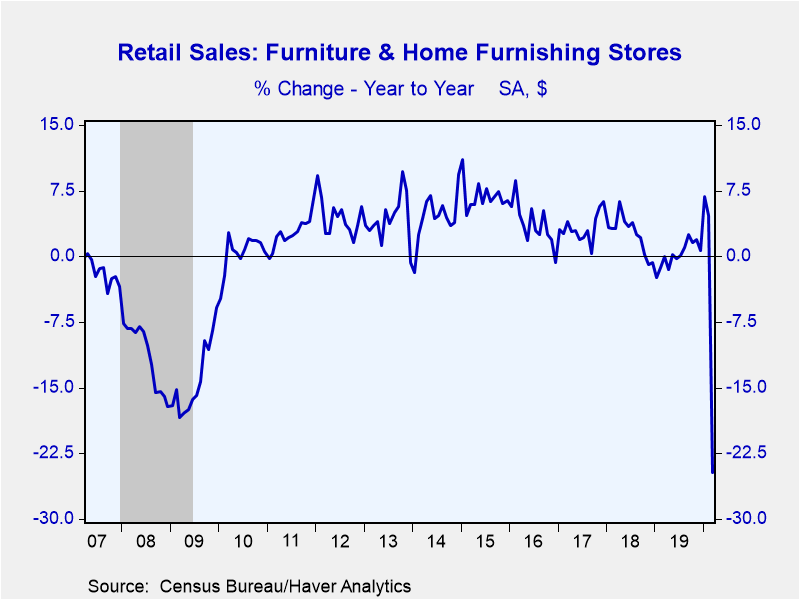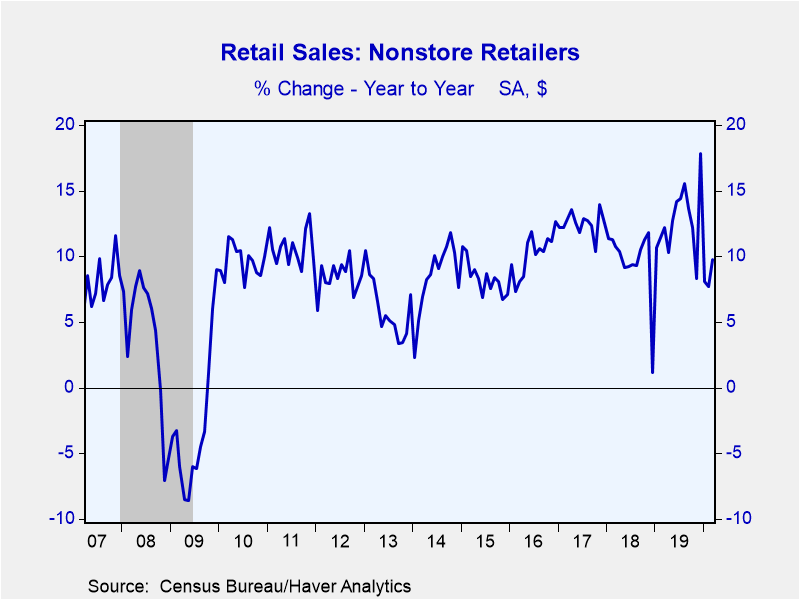 Global| Apr 15 2020
Global| Apr 15 2020U.S. Retail Sales Record Plunge, Weighed Down by Coronavirus Shutdowns
by:Tom Moeller
|in:Economy in Brief
Summary
• Consumers stay home and do without most new products. • Apparel & furniture sales are notably hard hit. Total retail sales including food service establishments plunged 8.7% (-6.2% y/y) during March after weakening 0.4% in February, [...]
• Consumers stay home and do without most new products.
• Apparel & furniture sales are notably hard hit.
Total retail sales including food service establishments plunged 8.7% (-6.2% y/y) during March after weakening 0.4% in February, revised from -0.5%. A 5.5% decline had been expected in the Action Economics Forecast Survey. Retail sales excluding motor vehicles & parts fell 4.5% (-1.7% y/y) following an unrevised 0.4% easing. A 2.1% decline had been anticipated. Motor vehicle & parts dealerships posted a 25.6% sales decline (-23.7% y/y) as unit sales of motor vehicles weakened by one-third m/m and y/y.
Retail sales fell 6.2% last month (-3.8% y/y) after slipping 0.5% in February. Apparel & accessory store sales plummeted 50.5% (-50.7% y/y), down sharply for the third straight month. Sales at furniture & home furnishings stores weakened 26.8% (-24.6% y/y) after easing 0.9%. Sporting goods, hobby, book & music store sales fell by roughly one-quarter both m/m and y/y. Electronics & appliance retailers realized a 15.1% decline in sales (-15.9% y/y) which came after a 0.9% drop. Restaurant and bar sales declined 26.5% (-23.0% y/y) with widespread closures of these establishments. Gasoline & service station sales fell 17.2% (-18.0% y/y) as prices dropped and driving was limited.
Partially offsetting these declines was a 25.6% surge (28.0% y/y) in food & beverage store sales as eating home became a necessity. General merchandise stores realized a 6.4% (7.5% y/y) surge in sales. Sales of nonstore retailers also strengthened 3.1% (9.7% y/y), the largest monthly increase since January of 2019. The gain followed two months of modest increase. Building materials & garden store sales improved 1.3% (7.6% y/y).
In another nondiscretionary sales category, health & personal care product stores improved 4.3% both m/m and y/y, following a 0.4% decline.
The retail sales data can be found in Haver's USECON database. The Action Economics forecast is in the AS1REPNA database.
Mitigating COVID-19 Effects with Conventional Monetary Policy from the Federal Reserve Bank of San Francisco is available here.
| Retail Spending (% chg) | Mar | Feb | Jan | Mar Y/Y | 2019 | 2018 | 2017 |
|---|---|---|---|---|---|---|---|
| Total Retail Sales & Food Services | -8.7 | -0.4 | 0.8 | -6.2 | 3.5 | 4.8 | 4.6 |
| Excluding Autos | -4.5 | -0.4 | 0.7 | -1.7 | 3.4 | 5.5 | 5.0 |
| Retail Sales | -6.2 | -0.5 | 0.7 | -3.8 | 3.4 | 4.6 | 4.5 |
| Retail Less Autos | -0.4 | -0.5 | 0.7 | 2.1 | 3.2 | 5.3 | 4.8 |
| Motor Vehicle & Parts | -25.6 | -0.5 | 0.8 | -23.7 | 4.0 | 2.3 | 3.4 |
| Gasoline Service Stations | -17.2 | -2.9 | -0.3 | -18.0 | 0.3 | 12.6 | 8.9 |
| Food & Beverage Stores | 25.6 | -0.1 | -0.2 | 28.0 | 3.0 | 4.0 | 4.2 |
| Food Service & Drinking Places | -26.5 | -0.2 | 0.9 | -23.0 | 4.4 | 6.3 | 5.9 |
Tom Moeller
AuthorMore in Author Profile »Prior to joining Haver Analytics in 2000, Mr. Moeller worked as the Economist at Chancellor Capital Management from 1985 to 1999. There, he developed comprehensive economic forecasts and interpreted economic data for equity and fixed income portfolio managers. Also at Chancellor, Mr. Moeller worked as an equity analyst and was responsible for researching and rating companies in the economically sensitive automobile and housing industries for investment in Chancellor’s equity portfolio. Prior to joining Chancellor, Mr. Moeller was an Economist at Citibank from 1979 to 1984. He also analyzed pricing behavior in the metals industry for the Council on Wage and Price Stability in Washington, D.C. In 1999, Mr. Moeller received the award for most accurate forecast from the Forecasters' Club of New York. From 1990 to 1992 he was President of the New York Association for Business Economists. Mr. Moeller earned an M.B.A. in Finance from Fordham University, where he graduated in 1987. He holds a Bachelor of Arts in Economics from George Washington University.
More Economy in Brief
 Global| Feb 05 2026
Global| Feb 05 2026Charts of the Week: Balanced Policy, Resilient Data and AI Narratives
by:Andrew Cates










